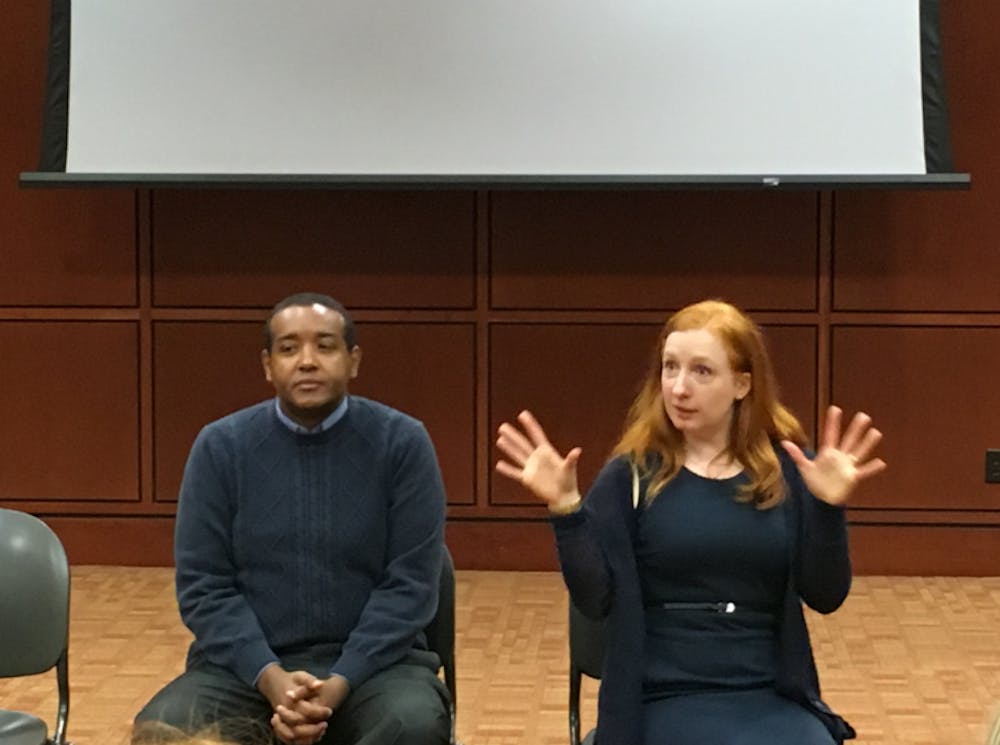Correction: The print version of this story didn't clarify the full list of those who presented during the Core Forums series. They have been added to this version. The Pendulum regrets the error.
As part of Elon University’s Spring 2016 Core Forums series, two professors organized "Stories of Migration,' a faculty-led panel addressing politically-charged issues of immigration and migration.
Robin Attas, assistant professor of music, and Carmen Monico, assistant professor of human service studies, organized the panel discussion held from 9:25-10:35 a.m. and 12:15-1:25 p.m. March 7, and 8-9:40 a.m. and 2:20-4 p.m. March 8 in LaRose Theatre.
The event featured assistant professor of anthropology Mussa Idris and assistant professor of theatre Susanne Shawyer. Idris was born in Eritrea while Shawyer was born in Canada. The two shared their personal experiences of entering the United States and then fielded questions from the audience.
“The day I was sworn in as a U.S. citizen, it made me wonder, ‘What am I going to do with this privilege?’” Idris said.
Others who presented throughout the series: Vanessa Bravo, assistant professor of communications; Ken Hassell, associate professor emeritus of art; Ahmed Fadaam, assistant professor of communications; David Parker, assistant professor of biology, Francois Masuka, director of international student and faculty scholar services; Mina Garcia-Soormally, associate professor of Spanish in the Department of World Languages and Cultures; and Emma Burress, former assistant director of study abroad.
Idris — who first left his hometown of Dekemhare, Eritrea in 2000 to study at the University of Florida, and then left again in 2006 to finish his Ph.D — was granted political asylum in 2008 after his country became unsafe for residency.
Idris was a first-generation college student whose education allowed him to safely leave his country.
Shawyer, who is not a U.S. citizen but does have a visa, began her presentation with a slideshow of her family tree. Looking at her immediate family, there was at least one immigrant in every generation.
Shawyer said she left Canada to study performing arts at the University of Texas at Austin and met her future husband while attending. When her student visa expired, she extended it using the Optional Practical Training (OPT) program. The OPT allowed her to extend her visa for an internship or training program. But because her then-fiance was a U.S. citizen, an extended visa would not be enough. Shawyer said she was fortunate her marriage allowed her to remain in the United States.
“It costs a lot of money to apply for a visa,” Shawyer said. “Visas aren’t free. We were able to go through the process because of various levels of privilege.”
Some of the privileges she listed included educational, economic and cultural. She added she and her fiance had the advantage of looking like an American couple.
Money isn’t the only sacrifice immigrants like Shawyer make. Because leaving without proper documentation voids a visa application, immigrants cannot return home. Shawyer said while she was applying for her visa, her father — who lives in Canada — became ill. She was disappointed that she was unable to leave the country to take care of him.
As for Idris, who is a citizen, leaving is possible but going home is much more difficult because of the current political climate in Eritrea.
“The hardest part for me is to not be able to go back to my home country,” Idris said. “Family separation is one of the most challenging things a migrant person can go through.”
The next Core Forum, “Q&A on Climate Change with Eileen Claussen,” will be held 9:25-10:35 a.m. and 12:15-1:25 p.m. April 6, and 8-9:40 a.m. and 2:20-4 p.m. April 7 in the Lakeside meeting rooms.


